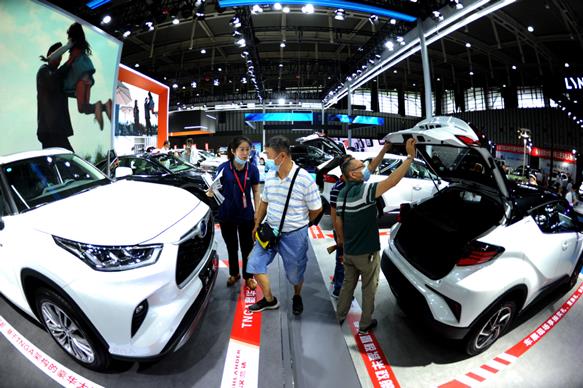
Country's automobile market expects to see June sales up more than 34 percent from May
China's auto market is rebounding, with sales in June expected to grow 34.4 percent from May, as vehicle production has returned to normal in the country and the government's package of measures have started to take effect, according to carmakers and analysts.
Vehicle sales last month were estimated to reach 2.45 million units, said the China Association of Automobile Manufacturers, based on preliminary figures from major carmakers across the country.
The figures would mark a 34.4 percent rise from May and a 20.9 percent increase year-on-year. They would bring sales in the first half of the year to 12 million, down 7.1 percent from the same period of 2021.
The fall was 12.2 percent year-on-year from January to May, according to statistics from the CAAM.
Retail sales of passenger vehicles, which account for the absolute majority of vehicle sales, could hit 1.92 million in June, said the China Passenger Car Association.
That would be up 22 percent year-on-year and up 42 percent over May. Cui Dongshu, secretary-general of the CPCA, attributed the robust performance to the country's raft of pro-consumption measures.
Among other things, the State Council halved car purchase taxes in June for a majority of gasoline models available in the market. The favorable measure will be valid by the end of this year.
Around 1.09 million cars received China's car purchase tax cut during the first month of the policy's implementation, according to the State Taxation Administration.
The tax cut policy had saved about 7.1 billion yuan ($1.06 billion) for car buyers, data from the State Taxation Administration showed.
According to the State Council, vehicle purchase tax cuts nationwide could total 60 billion yuan by the end of this year. Ping An Securities said the figure will account for 17 percent of vehicle purchase taxes levied in 2021.
Local authorities in scores of cities across the country have rolled out their packages as well, offering vouchers worth up to thousands of yuan.
Metropolises including Shanghai, Tianjin and Hangzhou in Zhejiang province as well as Guangzhou and Shenzhen in Guangdong province are combining to give out another 165,000 license plates this year.
Resumed vehicle production has ensured deliveries. At an event on June 18, Guo Shougang, a deputy director at the Ministry of Industry and Information Technology, said vehicle production in China has fully returned to normal.
Nasdaq-listed Nio saw its monthly deliveries rebound to exceed 10,000 units in June, saying "production and deliveries have fully returned to normal".
Another four startups, including Xpeng and Nezha, each sold over 10,000 vehicles in June, consolidating their momentum seen in previous months.
BYD saw its sales in June hit 134,000 units, up 162.7 percent year-on-year. Its sales in the first half of the year reached 641,350, replacing Tesla as the world's best-selling new energy vehicle maker.
The country's retail sales of new energy cars could set a record high by nearing 500,000 units in June, said the CPCA.
Cui at the CPCA said the results of this wave of policies are better than expected, and they are likely to further drive up sales in the coming months.
Last week, the Ministry of Commerce and 16 other central government departments issued a notice saying that China will implement a new wave of measures to spur car consumption.
They include facilitating the purchase and use of NEVs, scrapping certain regulations on secondhand vehicle sales and encouraging the replacement of old vehicles.
The country is considering extending purchase tax exemptions for NEVs, which will expire by the end of the year, the notice said.
The notice also urged more efforts to propel spending on NEVs in rural areas, speed up construction of charging facilities and guide charging pile operators to appropriately lower charging service fees.
Roy Lu, a Shanghai-based auto analyst, said the package of measures will clear obstacles that affect auto consumption and pave the way for its healthy development.
Compared with financial stimuli like halved purchase taxes for certain gasoline models, he said, the ministries' most recent moves are aimed at long-term results.
"If well-implemented, their positive effects on the market could last up to five years," said Lu, referring to measures about used vehicle transactions and parallel imports.
He said NEV sales will also maintain their rapid growth, as they sit atop the package of measures, in which local authorities are asked to facilitate their sales and use.
By the end of June, China saw a total of 10.01 million NEVs going on the road, according to statistics by the Ministry of Public Security.
During the first half of 2022, around 2.2 million NEVs were registered, hitting a new high with an increase of more than 1.1 million in a year. They accounted for nearly 20 percent of all new vehicle registrations from January to June this year, said the ministry.